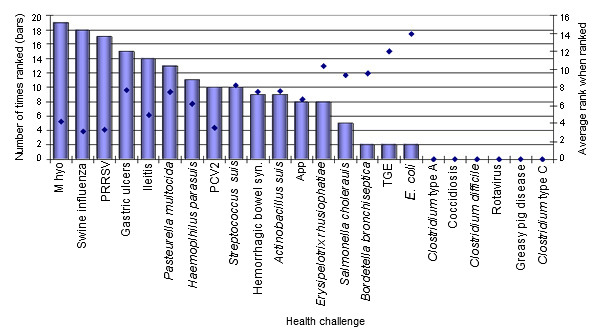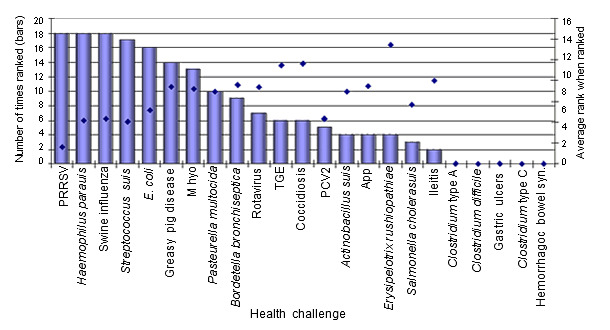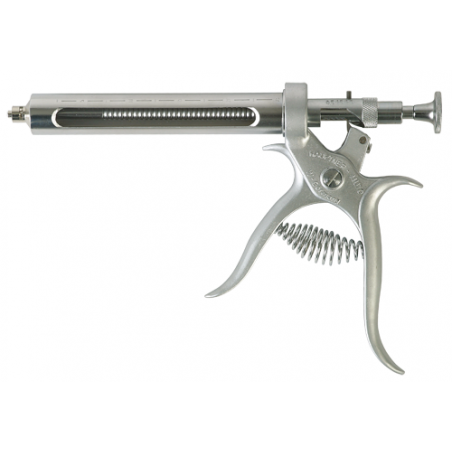Estimates of the economic impact of specific diseases on the swine industry are available for very few diseases. Recent research estimated the annual cost of PRRS in the U.S. to be approximately 664 million US dollars (Holtkamp et. al., 2013). While a current estimate of the economic impact of Mycoplasma hyopneumoniae (M. hyopneumoniae) in the U.S. has not been published, a comprehensive estimate of all major swine health challenges was done in 2006 to facilitate industry benchmarking and to help guide animal health related investments in the industry. The objective was to rank and quantify productivity and economic losses in the swine industry due to the major health challenges including M. hyopneumoniae. Information on production and economic impacts was obtained using a survey. The focus was on large production companies in the U.S. producing more than 150,000 pigs per year. When this analysis was completed, companies in this segment marketed just under half of the pigs sold annually in the U.S. Twenty production companies were invited to participate in the study based on their anticipated willingness to participate and availability of their veterinarian during the timeline of the project. Only one company that was invited to participate declined.
A survey was developed and administered to a single veterinarian at each company through face-to-face, personal interviews. The same interviewer administered all of the surveys in a consistent manner to minimize any differences in the results attributable to differences in how the surveys were administered. All nineteen of the surveys were conducted between November of 2005 and February of 2006.

The veterinarians were asked to identify and rank the health challenges in the breeding, nursery and finisher herds according to the productivity losses attributed to each in the production company they were representing. They were asked to rank all significant health challenges, single or combinations of pathogens, in the company over the last year. The veterinarians were then asked to provide an estimate of the percentage of animals in the company that were affected annually and an estimate of losses in affected breeding, nursery and finisher herds for each ranked health challenge.
Rankings of individual pathogens were not solicited directly in the survey. Instead, rankings were obtained for each health challenge. Where the health challenge involved a combination of two pathogens, the ranking was assigned to both pathogens. The most significant health challenges involving M. hyopneumoniae were identified in the finisher. It was ranked as a significant health challenge for all 19 companies, more than any other pathogen, with an average rank of 4.2, where 1 is the most significant challenge (Figure 1). In the nursery, M. hyopneumoniae was identified as a significant health challenge by 13 of the 19 companies with an average rank of 7.2 (Figure 2). M. hyopneumoniae was identified as a significant health challenge in the breeding herd by 12 companies with an average rank of 7.3.

Figure 1. Rank of pathogens in the finishing herd (the most serious challenge was ranked as 1 and the other challenges were ranked in increasing order. The higher the rank, the less significant the challenge).

Figure 2. Rank of pathogens in the nursery herd (the most serious challenge was ranked as 1 and the other challenges were ranked in increasing order. The higher the rank, the less significant the challenge).
Estimated losses associated with M. hyopneumoniae alone and M. hyopneumoniae in combination with PRRSV were among the four health challenges with the highest estimated average loss for all pigs in the study population reported in Table 1. Estimated losses due to M. hyopneumoniae were greatest in the finisher at $5.82 per affected pig marketed for M. hyopneumoniae alone and $6.69 per affected pig marketed in herds affected by M. hyopneumoniae and PRRSV in combination. Over a third of finishers were reported to be affected by M. hyopneumoniae alone and another 18% by M. hyopneumoniae in combination with PRRSV. The total estimated losses associated with M. hyopneumoniae for all pigs in the study populations, including affected and unaffected pigs, was $2.58 for M. hyopneumoniae alone and $1.21 for M. hyopneumoniae in combination with PRRSV for a total of $3.79 per pig marketed. The total losses associated with M. hyopneumoniae were second only to PRRSV. Extrapolated to all pigs raised and marketed in the U.S., the losses associated with M. hyopneumoniae was in the range of 375 to 400 million US$ annually.
Table 1. Summary of estimated economic losses for top four health challenges in all stages of production.
| Losses in affected herds (USD/pig marketed) |
% of animals affected | Average loss for all pigs (USD/pig marketed) |
||||||||
| Health challenge | Breeding | Nursery | Finisher | Breeding | Nursery | Finishing | Breeding | Nursery | Finishing | Total |
| PRRSV | 7.29 | 2.86 | 4.34 | 41.4 | 42.8 | 33.8 | 4.94 | 1.23 | 1.47 | 7.63 |
| M hyo | 1.52 | 1.92 | 5.84 | 17.6 | 10.0 | 34.3 | 0.39 | 0.19 | 2.00 | 2.58 |
| Influenza | 1.65 | 1.62 | 3.37 | 21.2 | 26.8 | 29.9 | 0.50 | 0.43 | 1.00 | 1.94 |
| PRRS + Mhyo | 6.69 | 18.1 | 1.21 | 1.21 | ||||||





